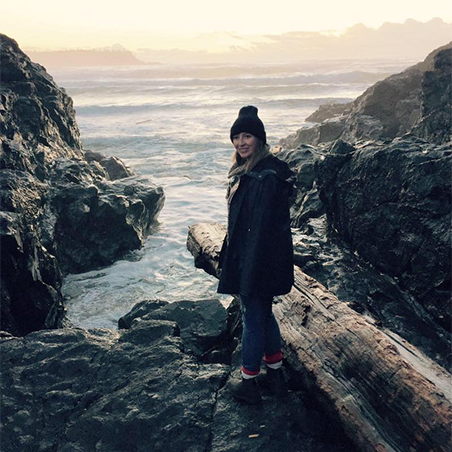Phoebe Johnston
Program Director, Halifax Association Community Living
Bachelor of Arts (Hons), Contemporary Studies and Social Anthropology, 2009
I actually felt like someone who could make a difference in the world.
Phoebe Johnston had graduated from King’s and, typical of many new grads, was looking for what to do next. A group of friends suggested she go with them to live in Berlin. Not a bad idea, Phoebe thought. But she had another one. She had been an equestrian when she was younger and wondered if she could earn a living, somewhere in Europe, working with horses or teaching riding. She sent out her horse resume (yes, there is such a thing) and she got a job in the Czech Republic on a small farm.
“While I was there, I gave riding lessons to a little girl with a disability,” Phoebe says. “The girl’s sister rode horses and at the end of each lesson, the little girl would get a chance to get on the horse. But it was like a pony ride. She wasn’t learning the skills. I wondered why. She was keen, she loved it. But no one had ever tried to teach her. So, I did. l taught her how to sit, I didn’t lead the horse around. I let her be independent on the horse. I gave her regular lessons. She learned quickly and it sparked something in me.”
After a year on that farm, Phoebe came back to Canada and got work as a job coach – helping people with disabilities enter the workforce. That work cinched it.
“I decided to get my degree and make this my profession.”
Phoebe went to the University of British Columbia for her Bachelor of Social Work followed by a Master’s in Social Work from McGill University.
She now works for the Halifax Association for Community Living.
“I work with people with developmental disabilities and their families as an advocate. I like to think of myself as taking a human rights approach to it, to advance their citizenship and rights in the community.”
Key to Phoebe’s work is that word “community”. Her goal is to help the people she works with to develop their independence enough to live in the community, not in group homes or institutions.
“When I was a new social worker, I worked with a woman with a disability who had lived in a group home for twenty years, since she was 18. She told me she didn’t want to live in that environment anymore. It didn’t challenge her. Within six months we had moved her into an independent living suite. She had support—her needs were being met. But now she was living independently in the community.”
It has been an interesting path for Phoebe.
“I was never an academic growing up,” she says. “I was social. I didn’t do a great job in high school. But after completing the Contemporary Studies Program (CSP) I felt more confident in myself, and my ability to think critically. I actually felt like someone who could make a difference in the world.”
Ask the girl in the Czech Republic or the woman she helped live independently and they would probably say she already has.
